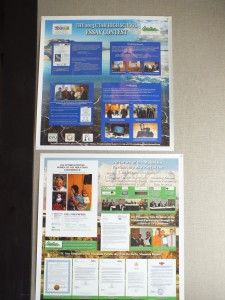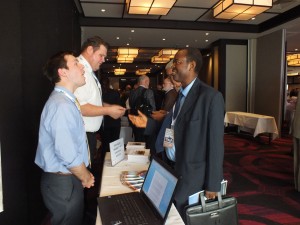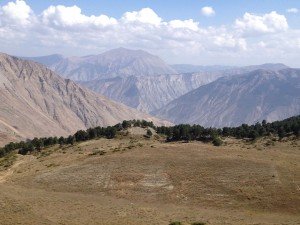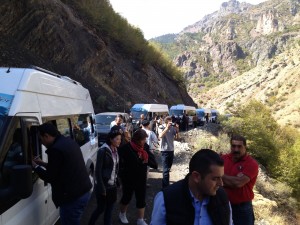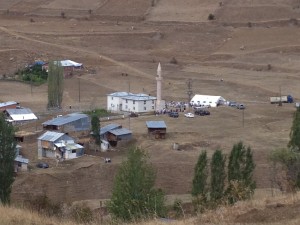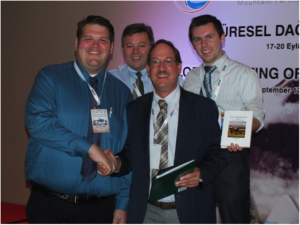On 25 May 2016, I was able to meet at the United Nations in New York with Dr Rusty Butler, who was Associate Vice President for International Affairs and Diplomacy at Utah Valley University (UVU) during 1992-2016 and Director of the Utah-Russia Institute at Utah Valley University.
 (L to R) Dzhukev and Dr Butler meet in front the UN HQ
(L to R) Dzhukev and Dr Butler meet in front the UN HQ
(©UIMF/Dzhukev Y.)
Dr Rusty Butler served also as a focal point (coordinator) of the Mountain Partnership under the Food and Agriculture Organization of the United Nations (FAO-UN) at UVU during the last 10 years. He was able to transform UVU into a leading institution in North America advocating the sustainable development goals (SDGs) and advancing the gender and sustainable mountain development (SMD) agenda in particular of the UN. One of his unique initiatives was to arrange visits to Utah and provide for UVU students an opportunity to host Permanent Representatives of many nations accredited to the UN. During visits, high-level foreign guests had a chance to be acquainted with the hospitality of the officials and local communities in Utah and to learn more about the model of sustainable development in Utah, one of the best SMD models in the US.
Dr Butler was recently appointed as main representative of the Russian Academy of Natural Sciences (RANS) at the UN Economic and Social Council (ECOSOC). RANS was registered as a NGO with Consultative Status under ECOSOC since 2002. Dr Butler visited the UN headquarters to prepare for the Fourth High-Level Political Forum at ECOSOC on Sustainable Development (HLPF). The event will take place on 11-15 July 2016, followed by a three-day ministerial meeting of the Forum on 18-20 July 2016. The theme of the 2016 session will be ‘Ensuring that no one is left behind,’ as decided in an ECOSOC plenary session on 14 March 2016.
Dr Butler kindly invited me to dinner on May 25th to talk about my activities as the first UVU intern at the United Nations. Furthermore, he was interested to know about my contribution to the event hosted by the Permanent Missions of Italy, Kyrgyz Republic, Malawi and Peru to the UN, Food and Agriculture Organization (FAO) Liaison Office in New York and Mountain Partnership Secretariat (MPS). Gathering discussed the findings of a MPS study called “Mapping the vulnerability of mountain peoples to food insecurity.” It was important for him to know that the majority of mountain communities are still vulnerable to hunger and other challenges related to food insecurity.
(L to R) Permanent Representative of the Kyrgyz Republic to the UN, H.E. Moldoisaeva and Dr Butler (©UIMF/Dzhukev Y.)
As one of the assignments, Dr Butler asked me to arrange a meeting for him with the newly appointed PR of the Kyrgyz Republic to the UN, H.E. Mirgul Moldoisaeva. Dr Butler has extensive connections with many officials at the Kyrgyz Republic. His wife Danielle was the Honorary Consul of the Kyrgyz Republic to the state of Utah during 2003-2011.
This was a great experience for me to learn protocol and to be able to arrange such a high-level meeting on such a short notice. However, Her Excellency Ambassador Moldoisaeva met Dr Butler in the late afternoon on 27 May.
During the meeting, the PR of the Kyrgyz Republic was impressed by Dr Butler’s background of working with many diplomats, including from her own nation and the fact that he was an Honorary Consul of Russia to Utah for 16 years. Dr Butler invited Ambassador Moldoisaeva to visit Utah on behalf of an organization called “Utah Ambassadors Hosting” to lecture at one of the universities in Utah, to meet with officials, as well as talk about the advantages of the nations that they represent and the need for establishing beneficial partnerships.
In addition, Ambassador Moldoisaeva was glad to know that UVU is the only undergraduate university in the US, which is a member of the Mountain Partnership and actively advocates SMD during last 10 years, in addition to applying the important aspect of the SDGs implementation into the undergraduate student curriculum. Ambassador Moldoisaeva stated: “Global alliances such as the Mountain Partnership allow us to create an effective global platform for poverty alleviation and food security in support of our national efforts.” She was also impressed when Dr Butler informed her that as part of the Open World Program, sponsored by the US Library of Congress, UVU has hosted seven Kyrgyz delegations of young leaders, in addition to numerous delegations from Central Asia and countries of the post-Soviet era in particular.
(L to R) H.E. Peter Thomson, PR of Fiji to UN and his wife; Irina Churkina, wife of H.E. Mr Vitaly Churkin, PR of the Russian Federation to UN; H.E. Ms Katalin Annamária Bogyay, PR of Hungary to UN and her husband (seated), Dr Rusty Butler and H.E. Mr Vitaly Churkin, PR of the Russian Federation to the UN (©Rusty Butler)
In addition, on the evening of 27 May, Permanent Representative of Hungary to the United Nations Her Excellency Ms Katalin Bogyay hosted an official dinner in honour of Dr Butler’s visit. The gathering at her residence was attended by H.E. Mr Peter Thomson, Permanent Representative of Fiji to the United Nations and his wife. Ambassador Thomson has a high chance to be elected as the President of the UN General Assembly for the 2016-2017 period. In addition, the dinner was attended by H.E. Mr Vitaly Churkin, Permanent Representative of the Russian Federation to the UN and his wife. The distinguished guests, close friends of Dr Butler, gave wonderful tributes to him, his family and wonderful hospitality, provided to each of them by the people of Utah, both on official level and among the general public, students and faculty included. During the evening, the diplomats also discussed some UN agenda items, SMDs and the SDGs.
While visiting New York City, Dr Butler also spent time with David Colton, UN Representative for LDS Charities with whom Dr Butler had dinner with H.E. Mr Charles Thembani Ntwaagae, a Permanent Representative of Botswana to the United Nations.
Before returning to Utah, Dr Butler had breakfast with the Permanent Representative of Georgia to the UN H.E. Kaha Imnadze whom he hopes to host again in Utah this fall for an all-Georgian art exhibit at the Springville Art Museum, possibly with the head of Georgian delegation during the session of the U.N. General Assembly as the honoured guest.
(L to R) H.E. Kaha Imnadze, Permanent Representative of Georgia to the UN and Dr Rusty Butler (©Rusty Butler)
Dr Butler also had a scheduled meeting with the Permanent Representative of Vietnam to the United Nations H.E. Mrs Nguyen Phuong Nga. Unfortunately, she was out of the country but her personal assistant connected with Dr Butler for a productive exchange.
Dr Butler will visit United Nations on regular basis. His continued partnerships and friendship with many Permanent Representatives accredited at the UN will provide more opportunities for engaged learning experiences for many people in Utah and the successful implementation of the SDGs, achieving Agenda 2030 of the UN, including students and faculty efforts at Utah universities.
I will be in touch with Dr Butler to make sure that his attendance of the Fourth High-Level Political Forum at ECOSOC on Sustainable Development (HLPF) on 11-15 July 2016 will be successful and he will be able to make an official statement about the importance of SMD being part of the SDGs implementation.
Yanko Dzhukev, an intern at the Office of Legal Affairs, Treaty Section Department, of the United Nations.









